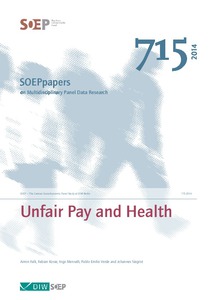Unfair pay and health

Deutsches Institut für Wirtschaftsforschung, Berlin
DIW - Berlin
2014
25 p.
health ; wage differential ; wages
SOEPpapers on Multidisciplinary Panel Data Research
715
Wages and wage payment systems
English
Bibliogr.
"This paper investigates physiological responses to perceptions of unfair pay. We use an integrated approach exploiting complementarities between controlled lab and representative field data. In a simple principal-agent experiment agents produce revenue by working on a tedious task. Principals decide how this revenue is allocated between themselves and their agents. Throughout the experiment we record agents' heart rate variability, which is an indicator of stress-related impaired cardiac autonomic control and has been shown to predict coronary heart diseases in the long-run. Using three measures of perceived unfairness our findings establish a link between unfair payment and heart rate variability. Building on these findings, we further test for potential adverse health effects of unfair pay using data from a large representative data set. The analysis includes cross-sectional and dynamic panel estimations. Complementary to our experimental findings we find a strong and highly significant negative association between health outcomes, in particular cardiovascular health, and the perception of unfair pay."
Digital
The ETUI is co-funded by the European Union. Views and opinions expressed are however those of the author(s) only and do not necessarily reflect those of the European Union or the ETUI.